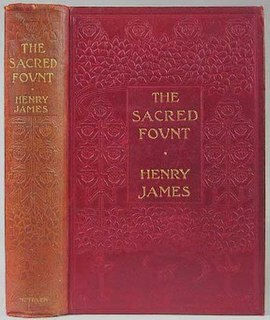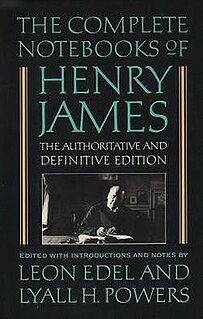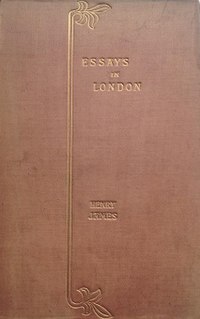
Henry James was an American author, who became a British subject in the last year of his life, regarded as a key transitional figure between literary realism and literary modernism and is considered by many to be among the greatest novelists in the English language. He was the son of Henry James Sr. and the brother of renowned philosopher and psychologist William James and diarist Alice James.

The Portrait of a Lady is a novel by Henry James, first published as a serial in The Atlantic Monthly and Macmillan's Magazine in 1880–81 and then as a book in 1881. It is one of James's most popular long novels and is regarded by critics as one of his finest.

The Ambassadors is a 1903 novel by Henry James, originally published as a serial in the North American Review (NAR). The novel is a dark comedy which follows the trip of protagonist Lewis Lambert Strether to Europe in pursuit of Chad Newsome, his widowed fiancée's supposedly wayward son; he is to bring the young man back to the family business, but he encounters unexpected complications. The third-person narrative is told exclusively from Strether's point of view.

Daisy Miller is a novel by Henry James that first appeared in Cornhill Magazine in June–July 1878, and in book form the following year. It portrays the courtship of the beautiful American girl Daisy Miller by Winterbourne, a sophisticated compatriot of hers. His pursuit of her is hampered by her own flirtatiousness, which is frowned upon by the other expatriates when they meet in Switzerland and Italy.

Joseph Leon Edel was an American literary critic and biographer. He was the elder brother of North American philosopher Abraham Edel.

Guy Domville is a play by Henry James first staged in London in 1895. The première performance ended with the author being jeered by a section of the audience as he bowed onstage at the end of the play. This failure largely marked the end of James' attempt to conquer the theater. He returned to his narrative fiction and recorded this memorable pledge in his Notebooks on 23 January 1895: "I take up my own old pen again – the pen of all my old unforgettable efforts and sacred struggles. To myself – today – I need say no more. Large and full and high the future still opens. It is now indeed that I may do the work of my life. And I will."

The Aspern Papers is a novella by American writer Henry James, originally published in The Atlantic Monthly in 1888, with its first book publication later in the same year. One of James's best-known and most acclaimed longer tales, The Aspern Papers is based on the letters Percy Bysshe Shelley wrote to Mary Shelley's stepsister, Claire Clairmont, who saved them until she died. Set in Venice, The Aspern Papers demonstrates James's ability to generate suspense while never neglecting the development of his characters.

The Princess Casamassima is a novel by Henry James, first published as a serial in The Atlantic Monthly in 1885 and 1886 and then as a book in 1886. It is the story of an intelligent but confused young London bookbinder, Hyacinth Robinson, who becomes involved in radical politics and a terrorist assassination plot. The book is unusual in the Jamesian canon for dealing with such a violent political subject. But it is often paired with another novel published by James in the same year, The Bostonians, which is also concerned with political issues, though in a much less tragic manner.

The Bostonians is a novel by Henry James, first published as a serial in The Century Magazine in 1885–1886 and then as a book in 1886. This bittersweet tragicomedy centres on an odd triangle of characters: Basil Ransom, a political conservative from Mississippi; Olive Chancellor, Ransom's cousin and a Boston feminist; and Verena Tarrant, a pretty, young protégée of Olive's in the feminist movement. The storyline concerns the struggle between Ransom and Olive for Verena's allegiance and affection, though the novel also includes a wide panorama of political activists, newspaper people, and quirky eccentrics.

The Tragic Muse is a novel by Henry James, first published as a serial in The Atlantic Monthly in 1889-1890 and then as a book in 1890. This wide, cheerful panorama of English life follows the fortunes of two would-be artists: Nick Dormer, who throws over a political career in his efforts to become a painter, and Miriam Rooth, an actress striving for artistic and commercial success. A cast of supporting characters help and hinder their pursuits.

The Sacred Fount is a novel by Henry James, first published in 1901. This strange, often baffling book concerns an unnamed narrator who attempts to discover the truth about the love lives of his fellow guests at a weekend party in the English countryside. He spurns the "detective and keyhole" methods as ignoble, and instead tries to decipher these relationships purely from the behavior and appearance of each guest. He expends huge resources of energy and ingenuity on his theories, much to the bemusement of some people at the party.

The Notebooks of Henry James are private notes made by the American-British novelist and critic. Usually the notes are of a professional nature and concern ideas for possible or ongoing fictions, but there are a number of personal notes as well. James made entries in the Notebooks throughout most of his career.

French Poets and Novelists is a book of literary criticism by Henry James published in 1878. The book collected essays that James had written over the preceding several years. From an early age James was fluent in French and read widely in the country's literature. These essays show a deep familiarity with the techniques and themes of many French writers. The book also includes an interesting essay on Russian novelist Ivan Turgenev, who James read in a German translation.
Partial Portraits is a book of literary criticism by Henry James published in 1888. The book collected essays that James had written over the preceding decade, mostly on English and American writers. But the book also offered treatments of Alphonse Daudet, Guy de Maupassant and Ivan Turgenev. Perhaps the most important essay was The Art of Fiction, James' plea for the widest possible freedom in content and technique in narrative fiction.

Essays in London and Elsewhere is a book of literary criticism by Henry James published in 1893. The book collected essays that James had written over the preceding several years on a wide range of writers including James Russell Lowell, Gustave Flaubert, Robert Browning and Henrik Ibsen. The book also included an interesting general essay on the role of the critic in literature and a piece of travel writing about London.

Notes on Novelists is a book of literary criticism by Henry James published in 1914. The book collected essays that James had written over the preceding two decades on French, Italian, English and American writers. The book also contained a controversial essay, The New Novel, 1914, which passed judgment on various contemporary writers and occasioned much disagreement.
Philip Horne is a teacher and literary critic specializing in 19th century literature, particularly Henry James and Charles Dickens. Educated at King's College School and Cambridge University, he is currently Professor of English at University College London.
A Passionate Pilgrim is a novella by Henry James, first published in The Atlantic Monthly in 1871. The story was the earliest fiction that James included in the New York Edition (1907–09) of his works. Set in England, the tale shows James' strong interest in the contrast between the Old World and the New. In fact, the difference between America and Europe erupts into open conflict in the story, which leads to an ironic ending.
Michael Anesko is a U.S. literary critic, writer and professor. He is perhaps best known for his studies of 19th-century American novelists, in particular, Henry James and William Dean Howells. He is currently a professor of English at Pennsylvania State University and previously served as faculty advisor for the department's undergraduate honors program. He lives in State College, Pennsylvania, where he was born, and also in Cambridge, Massachusetts.
This is a list of the works of Henry James, an American writer who spent the bulk of his career in Britain.













